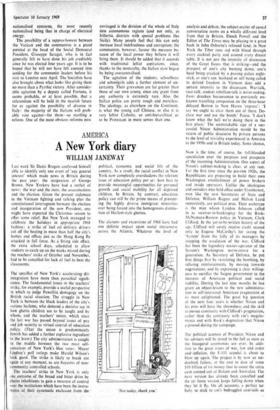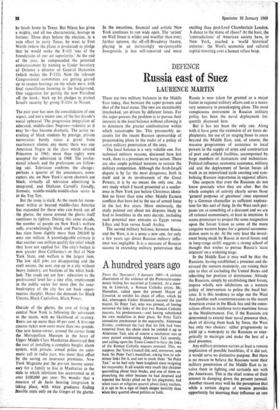A New York diary
AMERICA WILLIAM JANEWAY
Last week Sir Denis Brogan confessed himself able to identify only one event of 'any general interest' which made news in Britain during the past year: the resignation of George Brown. New Yorkers have had a surfeit of news: the war and the riots; the assassinations and the election. Given the present stalemate in the Vietnam fighting and talking plus the constitutional interregnum between the election and inauguration of the new President, one might have expected the Christmas season to offer some relief. But New York managed to celebrate the holidays in appropriate 1968 fashion : a' strike of fuel oil delivery drivers cut off the heating in more than half the city's homes and offices just as the Hong Kong flu attacked in full force. As a fitting side effect, the extra school days, scheduled to allow students to catch up on the weeks missed during the teachers' strike of October and November, had to be cancelled for lack of fuel to heat the classrooms.
The specifics of New York's aecelerating dis- integration have more than parochial signifi- cance. The fundamental issues in the teachers' strike, for example, provide a useful perspective in which to judge Powellite demagogy on the British racial situation. The struggle in New York is between the black leaders of the city's various harleins, who demand a decisive say in how ghetto children are to be taught and by whom, and the teachers' union, which since the last war has passed beyond issues of pay and job security to virtual control of education policy. (That the union is predominantly Jewish has added a further explosive ingredient to the brew.) The city administration is caught in the middle between the two most self- conscious of New York's bloc votes: Mayor Lindsay's poll ratings make Harold Wilson's look good. The strike is likely to break out again at any moment, as are boycotts of non- community controlled schools.
The teachers' strike in New York is only one outcome of the broad and bitter drive by ghetto inhabitants to gain a measure of control aver the institutions which have been the instru- ments of their systematic exclusion from the political, economic and social life of the country. As a result, the racial conflict in New York now completely overshadows the relevant issue of education policy per se: how best to provide meaningful opportunities for personal growth and social mobility for all deprived children. In Britain, by contrast, education policy can still be the prime means of prevent- ing the highly diverse immigrant minorities ever being forced into the homogenous damna- tion of Harlem-style ghettos.
The alarums and excursions of 1968 have had one definite impact upon social intercourse across the Atlantic. Whatever the level of `Not today, thank you.' analysis and debate, the subject-matter of casual conversation seems on a wholly different level from that in Britain. Enoch Powell and the Editor of The Times may be playing to a great hush in John Osborne's refound land; in New York the Tiber runs red with blood through every cocktail party and around every dinner table. It is not just the intensity of discussion of the Great Issues that is striking—and the prospect of one's city burning down, one's head being cracked by a passing police night- stick, or one's son, husband or self being called to defend freedom in Vietnam does add a certain intensity to the discussion. War-talk, race-talk, student rebellion-talk is never-ending. Item: drunken businessman to previously un- known travelling companion on the three-hour delayed Boston to New Haven 'express': 'I say we ought to clear them out of there. De- clare war and use the bomb.' Pause. 'I don't know what the hell we're doing there in the first place.' The unmistakable sign of a suc- cessful Nixon Administration would be the return of public discourse by private persons to the level of triviality experienced in America in the 1950s and in Britain today. Some chance.
Now is the time, of course, for full-blooded speculation over the purposes and prospects of the incoming Administration. One aspect of Nixon's cabinet-making is clear, at any rate. For the first time since the pre-FDa 1920s, the Republicans are preparing to build their own Washington establishment of power brokers and inside operators. Unlike the ideologues and outsiders who held office under Eisenhower, men like the new Secretaries of State and Defence, William Rogers and Melvin Laird respectively, are political pros. Their archetype is the man whom Lyndon Johnson called in as receiver-in-bankruptcy for the Rusk- McNamara-Rostow policy in Vietnam, Clark Clifford. In the yet-to-be-written history of the age, Clifford will surely receive• credit second only to Eugene McCarthy's for saving the 'System' from the folly of its managers by stopping the escalation of the war. Clifford . has been the legendary master-operator of the System's Washington nerve-centre for a generation. As Secretary of Defence, he put first things first by restricting the bombing, by refusing reinforcements, by moving towards negotiations, and by expressing a clear willing- ness to sacrifice the Saigon government in the interests of American political and social stability. During the last nine months he has given an object-lesson to the new administra- tion in self-interested American pragmatism at its most enlightened. The great big question of the next four years is whether Nixon and his pros will have the shrewdness and the skill to pursue continuity with Clifford's pragmatism, rather than the continuity with tee's megalo- mania and with Rusk's dogmatism that Nixon espoused during the campaign.
The political acumen of President Nixon and his advisers will be tested to the full as soon as the Inaugural ceremonies are over. In addi- tion to the great issues of war, law and order andr.inflation, the F-111 scandal is about to blow up again. The project is by now an un- doubted failure, at the cost to date of some $10 billion of us money (not to count the extra cash conned out of Britain and Australia). The navy version has already been cancelled and the air force version keeps falling down when they let it fly. On all accounts, a perfect tar baby to stick to LBA bedraggled coat-tails as be heads home to Texas. But Nixon has given a mighty, and all too characteristic, hostage to fortune. Three days before the election, in a vain effort to carry Texas, he went to Fort Worth (where the plane is produced) to pledge that he would make the F-111 'one of the foundations of our air superiority.' At the end of the year, he compounded the potential embarrassment by naming as Under Secretary of Defence a director of General Dynamics (which makes the F-111). Now the relevant Congressional committees are getting geared up to reopen hearings on the whole mess, with final cancellation looming in the background. One suggestion for getting the new President off the hook : back up his pledges to protect Israel's security by giving F-111s to Nasser.
The past year has seen the consolidation of one aspect, and not a minor one, of the last decade's social upheaval. The progressive integration of educated, middle-class Negroes—tokenist as it may be—has become dramatic. The active re- cruiting of black students by prestige, private universities barely raises a growl from reactionary alumni any more; there was one American Negro in the class which entered Princeton in 1961; more than eighty were accepted for admission in 1968. The profes- sional schools and the professions are follow- ing suit. Television confirms the change: perhaps a quarter of the announcers, news- casters, etc, on New York's seven channels are black, virtually all television advertising is integrated, and Diahann Carroll's friendly, formula, middle-middle-middle-class series is in the Top Ten.
But the irony is stark. As the room for move- ment within or beyond middle-class America has expanded for those who can break out of the ghetto, the noose around the ghetto itself continues to tighten. During this same decade, the number of people on New York's welfare rolls, overwhelmingly black and Puerto Rican, has risen from slightly more than 200,000 to over one million. A knowledgeable estimate is that another one million qualify for relief which they have not applied for. The city's budget_ is now greater than California's or that of New York State, and welfare is the largest item. The low skill jobs are disappearing and the craft unions, the next step up in a city without heavy industry, are bastions of the white bick- lash. The roads out are few : education to the professional level for a tiny elite, employment in the public sector for more (but the near- bankruptcy of the city has cut back oppor- tunities sharply). Hence the demands for Black Unions, Black Capitalism, Black Power.
Outside of the ghetto, the cost of living in central New York is following the astronauts to the moon, with no likelihood of re-entry. Rents are up more than 40 per cent. A first-run cinema ticket now costs more than two pounds. One new house-owner, around the corner from the Metropolitan Museum in the heart of Upper Middle Class Manhattan discovered that the cost of installing a complete burglar alarm system, with private, armed police on auto- matic call in radio cars, was more than offset by the saving on insurance premiums. New York Magazine put the pre-tax income neces- sary for a family to live in Manhattan in the style to which television has accustomed us at over $100,000 per year. No wonder that a measure of de facto housing integration is taking place, with white graduates finding feasible rents only on the fringes of the ghetto. In the meantime, financial and artistic New York continues to run wide open. The 'action' on Wall Street is wilder and woollier than ever; further uptown, the off-off-Broadway theatre, playing to an increasingly un-epatayable bourgeoisie, is less self-censored and more exciting than post-Lord Chamberlain London. A dance to the music of chaos? At the least, the `contradictions' of American society have, in New York, reached a 'world historical' extreme: the West's economic and cultural capital towering over a human refuse heap.



































 Previous page
Previous page